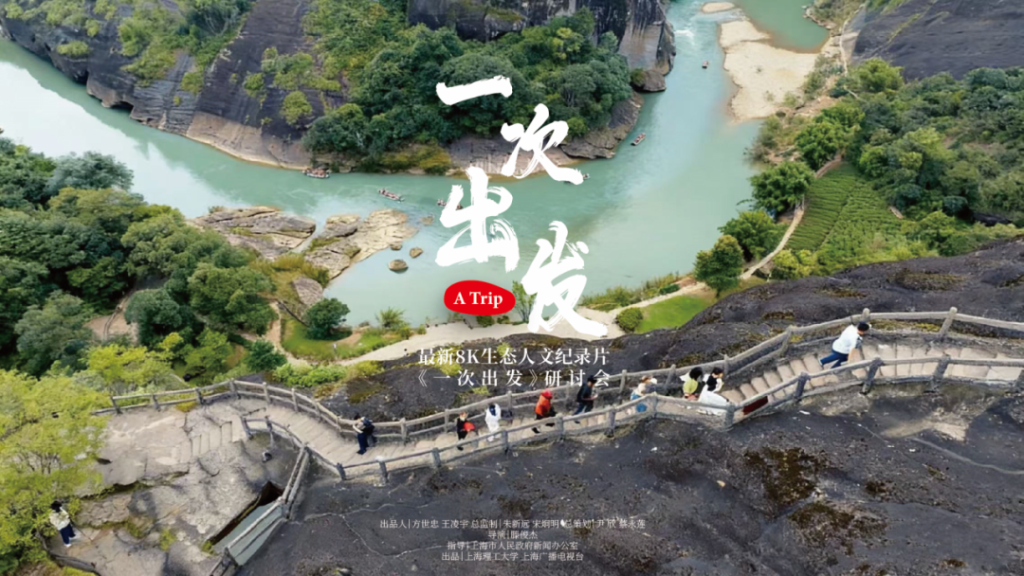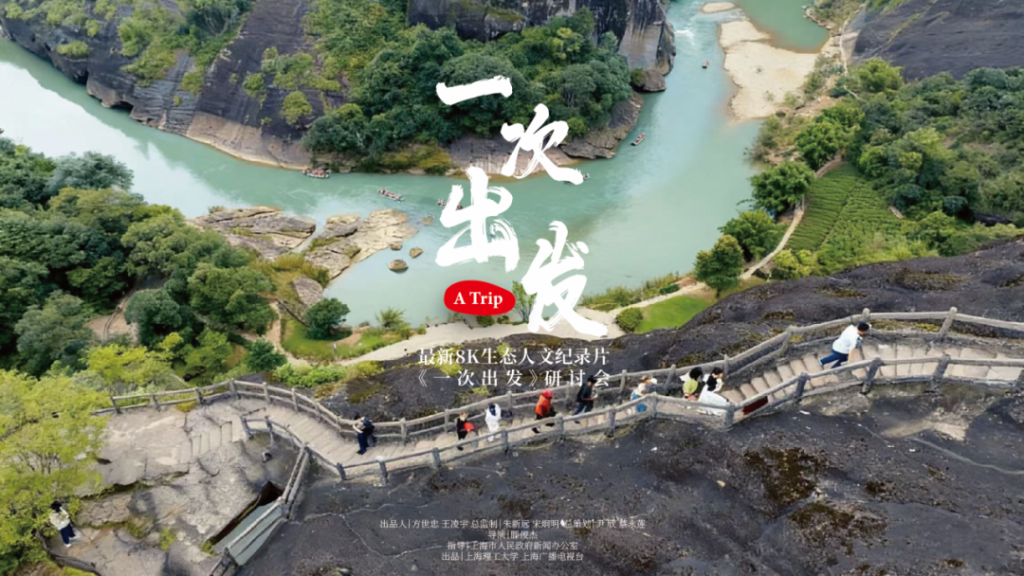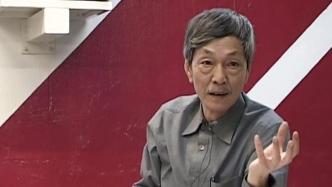
【Editor's note】
Professor Situ Zhaodun, a member of the Communist Party of China, a famous film educator, film artist, and former director of the Director Department of Beijing Film Academy, died of illness on August 31, 2023 at the age of 84.
Wei Shiyu, a professor at the City University of Hong Kong and a documentary filmmaker, wrote an article to miss Mr. Situ's time as a visiting professor at the City University of Hong Kong.
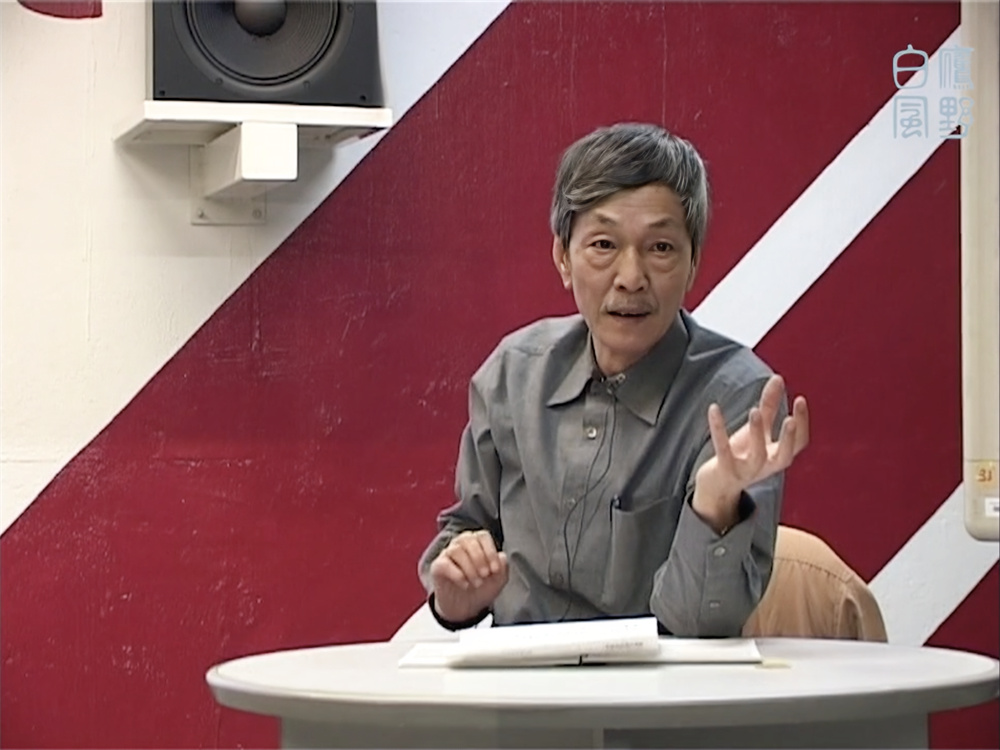
Situ Zhaotun is teaching. All pictures in this article were taken/provided by the author.
One of the luckiest things in my life is to learn documentaries from Mr. Situ Zhaotun and learn to be a good teacher from him at the same time.
In 2003, at the School of Creative Media, City University of Hong Kong where I was teaching, my senior colleague Professor Liu Zhiqiang received a grant and invited Mr. Situ to come to our school to teach documentaries to MFA students. Because City University taught in English and Situ taught in Mandarin, the college asked me to assist him in class and sent me to Beijing to pick Situ to Hong Kong.
The memory of the first visit is as clear as yesterday, and the three cabinet walls in the living room are full of video tapes, VCDs and DVDs. After chatting for a while, the teacher asked me if I had watched the Iranian movie "Little Shoes"? I said no. He took out a DVD and played a part of it: the little brother and sister only have a pair of worn-out sneakers, and the elder brother ran home after school so that the younger sister could wear the shoes before going to school. After watching it for a few minutes, tears welled up in my eyes, and a smug smile appeared on his face: "Look at his film language, how good it is!" Although I have a doctorate in film studies and watch films every week, I have never seen anything like He's such a movie lover! At that time, I decided to take pictures of Situ's every class.
The first class was held in the MFA student computer room. Situ said at the beginning: "The things recorded in the documentary are often irreplaceable, and irreplaceability is the value." He listened to the class next to him, and in the second week, he simply moved into the largest screening room in the hospital to attend class.
The teacher didn't know how to type at the time, and would give me a handwritten outline every week before class. I found out later that he had four notebooks, on which were written the first to fourth drafts of the outline, and the final draft for me, which I copied for everyone. I soon felt that every student, no matter who originally majored in animation, photography or multimedia, took documentary as the most important subject because of Situ's serious attitude, and put in the most time and effort.
I aspired to be a university teacher at the age of 16, but after finishing my Ph.D. in Canada and joining CityU, my student scores were not satisfactory for three consecutive semesters. At that time, I attributed the problem to the fact that Hong Kong students did not speak English well enough and were not curious enough. Before Szeto came to CityU, he was the teacher with the highest student ratings at Beijing Film Academy for three consecutive years, but can he cope with students from Hong Kong? When the semester started, Situ was not full of confidence, but very nervous, fearing that the students would not be able to take pictures in the short 13-week semester.
I was already filming a documentary with Director Peng Xiaolian. A few weeks after the class started, I felt that I knew how to deal with many practical problems. For example, in a class, Situ talked about "gazing and listening": "When shooting a documentary, you should not only shoot with your eyes, but also with your ears." That is to say, it is not enough for the photographer to just stare at the camera. If you notice movement around you, you should quickly decide whether to make adjustments.
Situ also used four lessons to talk about "the relationship between the photographer and the person being photographed", saying that the shooting process is a life journey shared by the two, and the two parties cannot "marry" but should maintain a "lover" relationship. Mutual trust is the most important, so Situ firmly opposes secret photography. When talking about editing, he said, "The audience only cares about the story, and the audience doesn't care how hard you worked to get that shot." He knows very well which shots directors are reluctant to cut.
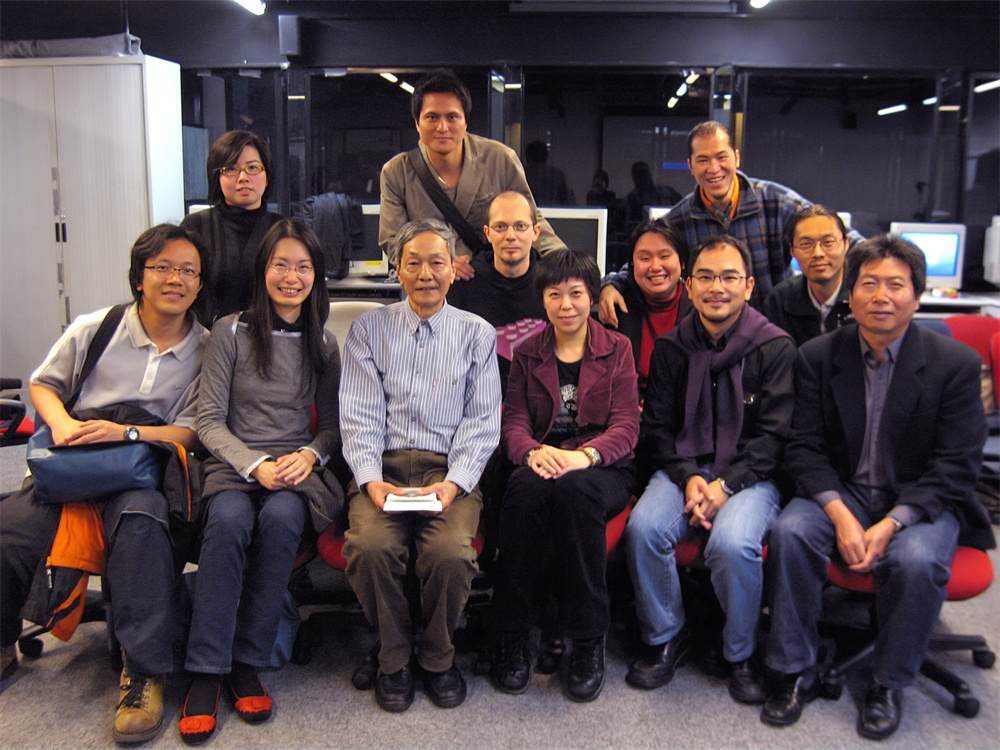
Teacher Situ (third from left in front row), Wei Shiyu (fourth from left in front row) and some students from the documentary class.
For the first month or two, my wife hadn't come yet, so I tried to have meals with the teacher as much as possible. A few weeks later, some classmates began to tell him what they were planning to shoot, and he became very excited. As soon as the computer room opened at 8 o'clock every morning, he would go to see if any students were editing films. However, students from Hong Kong usually only arrive after 11 o'clock. . After half the semester, some students started to edit films. Situ came to the computer room in the morning and afternoon to watch his classmates edit films.
Several classmates told me, "The teacher was looking behind me but didn't speak. It sent chills down my spine!" I asked Situ why he didn't speak. It turned out that he saw a lot of mistakes and couldn't bear to say anything: "It was the first time he did an affirmation." There are many mistakes, but you can't criticize, otherwise he won't make documentaries." Later, Situ Hui sat next to the student and occasionally gave a few words of advice, which made the student feel at ease.
I was filming nearby with a camera. As time went by, they got used to me. Situ would sometimes praise me with his students: "Look at her, she took pictures with her ears on!" Once he turned around and saw me still taking pictures, he smiled and pointed at my lens and said, "Peeping into other people's privacy." ", everyone laughed.
That semester, I felt that being a teaching assistant was more tiring than teaching two classes on my own, but I was tired but happy at the same time. At the same time, I understand why students give Teacher Situ high marks. In addition to answering all questions, his dedication to every student documentary makes them feel that they are not just doing a homework, but doing something meaningful.
The first film completed in the class was a documentary short filmed by Wu Xinlu on his father. Like many Hong Kong families, Xinlu's father was the first to immigrate to Hong Kong from Fujian. He did not come with his mother and siblings until he was a teenager. After not living together for many years, he felt strange to his father and had little communication with him. Taking advantage of the documentary class, he plucked up the courage to ask his father if he could film him. When he started filming, his hands were shaking. Later, the father and son gradually started talking about more topics.
Szeto liked this work very much, and it was screened at the Urban Culture Salon of City University’s old president Zhang Xingang. Many celebrities were present, including director Tsui Hark and producer Li Shaowei. After reading the review, an Asia Television executive said, "Excuse me, Mr. Situ, how can a film with such a slow pace attract the attention of the audience?" Before Situ could speak, Swedish sinologist Luo Duobi retorted, "In my opinion, the rhythm is Slowness is not a problem, too many movies and TV shows nowadays are too fast!" Later Luo Duobi came to our screening room and watched more students' works with great interest. In the 13th Monday semester, starting from the tenth week, 25 debut documentaries were produced one after another, which can be described as Hong Kong speed! Situ finally felt relieved.
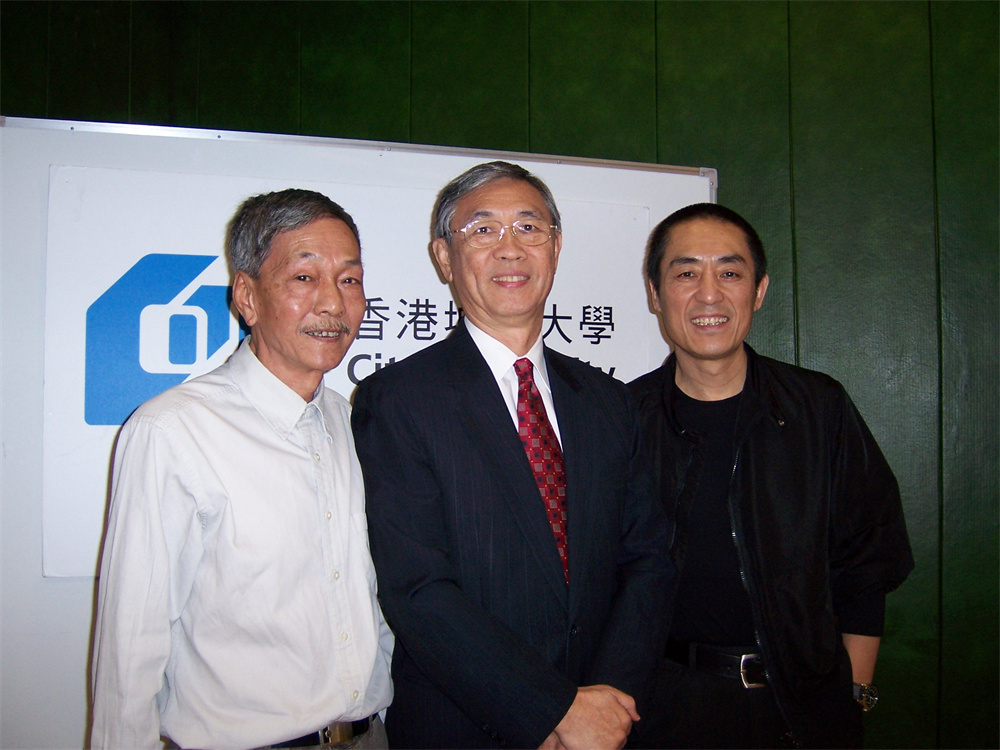
Professor Situ Zhaodun, President Zhang Xingang, Director Zhang Yimou
Because many students wanted to revise their works better, the college made an exception and extended Situ's visiting time. During the New Year period, a classmate invited her teacher, mistress, and classmates to go to her farmland to eat New Year Poon Choi together. Afterwards, President Zhang Huijun of the Beijing Film Academy led a delegation of heads of departments to visit our school, followed by the vice-president and deputy heads of each department.
Although CityU’s School of Creative Media was the first school in Asia to offer simultaneous teaching of new and old media, the school did not have a building at that time. After visiting several computer rooms, we gathered in the screening room to see the achievements of Teacher Szeto. A video shot by British student Nick was screened. The story of a British captain who sailed a sailboat back to the UK from Hong Kong in 1997. Indian student Shen Teer filmed the story of two Indian families fighting for a Filipino maid in the building where they lived. Both later won grand prizes in student competitions. Two years later, Teacher Situ came again to teach documentary and performance classes.
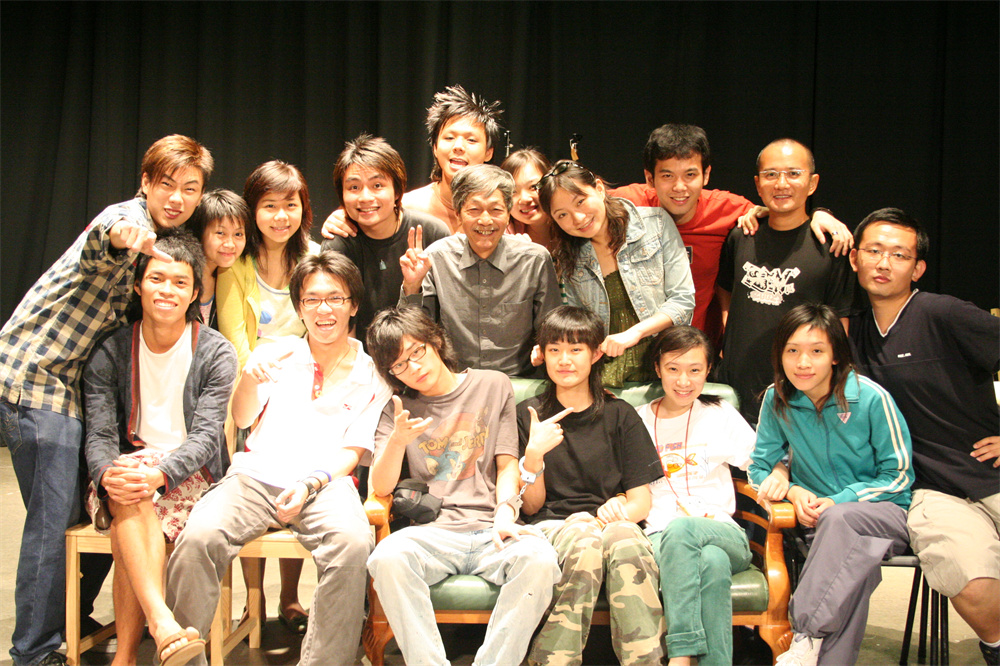
Stuart Siu-tun also teaches undergraduate acting classes
Teacher Situ taught me to be a good teacher, especially in creative writing classes. "It is useless to criticize students." The key point is to be able to see the shining point that everyone wants to express, and then encourage them and help them use it. The movie shows up.
Twenty years ago, Szeto was known as the "godfather" of independent documentaries in China. He indeed regarded recording the truth as a belief and documentaries as an ideal: "You must have another job, documentaries cannot support you." Twenty During the year, I completed four feature-length documentaries and three TV documentaries. As Mr. Situ said, each work "is an unforgettable journey." If not, why do you want to shoot?

Szeto Siu-don attended the unveiling ceremony of the Sun Yat-sen statue at the University of Hong Kong. The Sun Yat-sen sculpture was made by his younger brother Szeto Siu-kwong.
